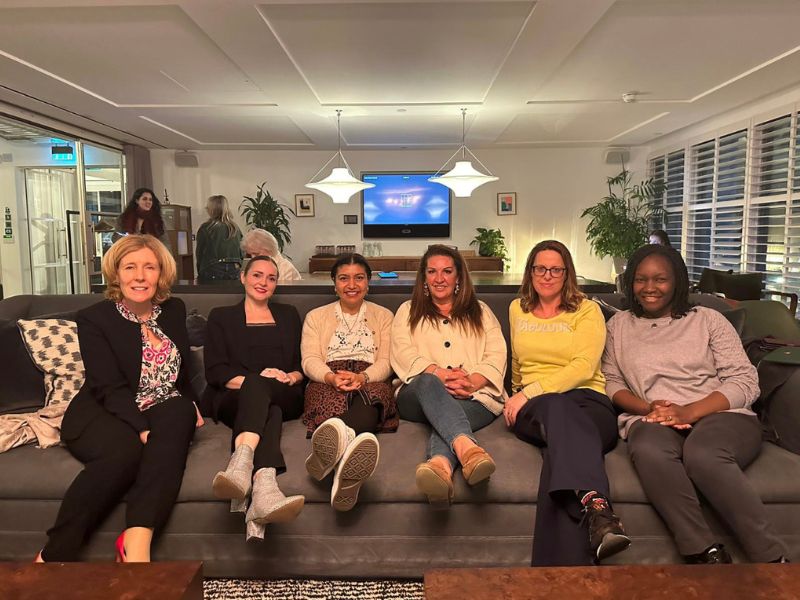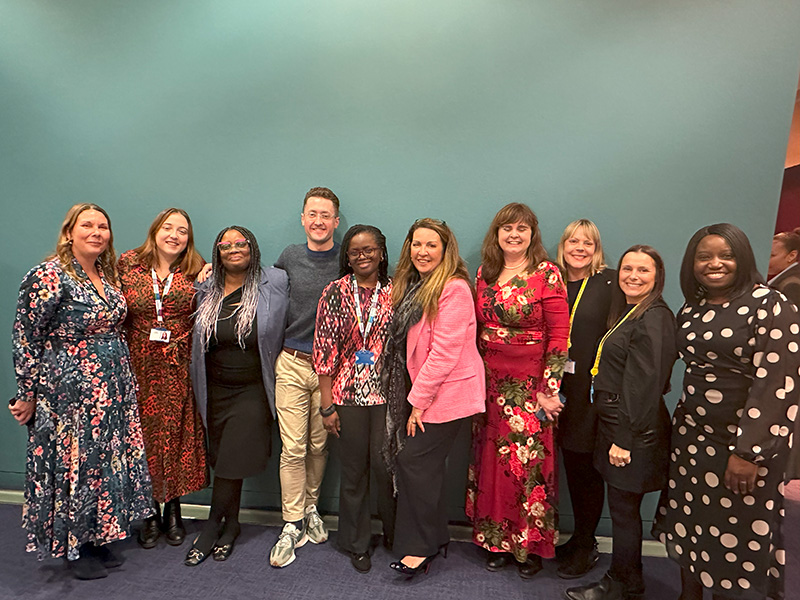Last Friday we hosted the WeAreFutureLeaders conference at County Hall in Westminster.
It was a wonderful day-long event full of interesting talks from a number of renowned speakers.
Find out what happened in the afternoon sessions in this article.
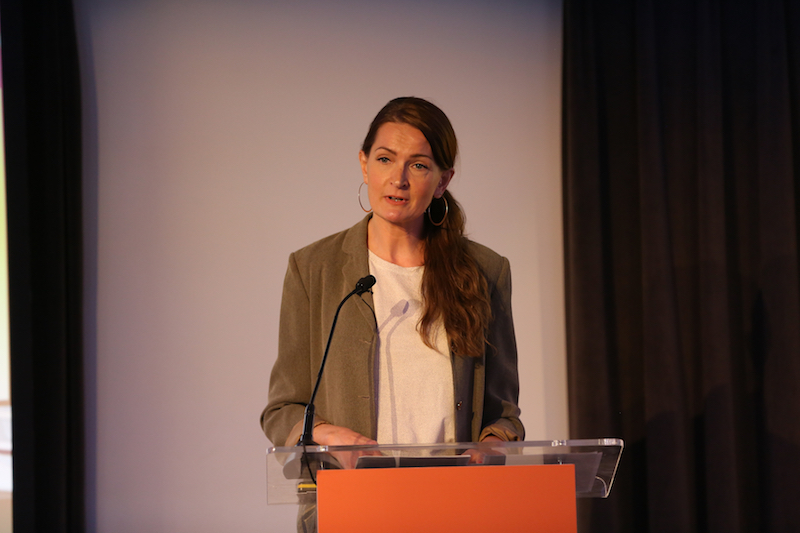
Leading through activism – Sophie Walker, feminist and founding leader of the Women’s Equality Party
Sophie began the session by defining an activist as some who has a huge dream to bettering the world, in this sense activists have a lot in common with good leaders. When women deciding they are going to be leaders they are doing something different. As our current society is not one that is structured towards women, we have to carve out our own space. This can be seen by the sheer fact that 54,000 women lose their jobs every year due to being pregnant. Sophie continued by saying that we need to define ourselves by what we want to achieve with others rather than as individuals. In our current culture, it’s the structure that is broken, not you. The experience that you have amounted is golden and your life story can and should be your CV. Ultimately, ego doesn’t breakdown barriers, collaboration does. To be an activist and a good leader is to reject the idea that we need to stand alone and to start standing together.
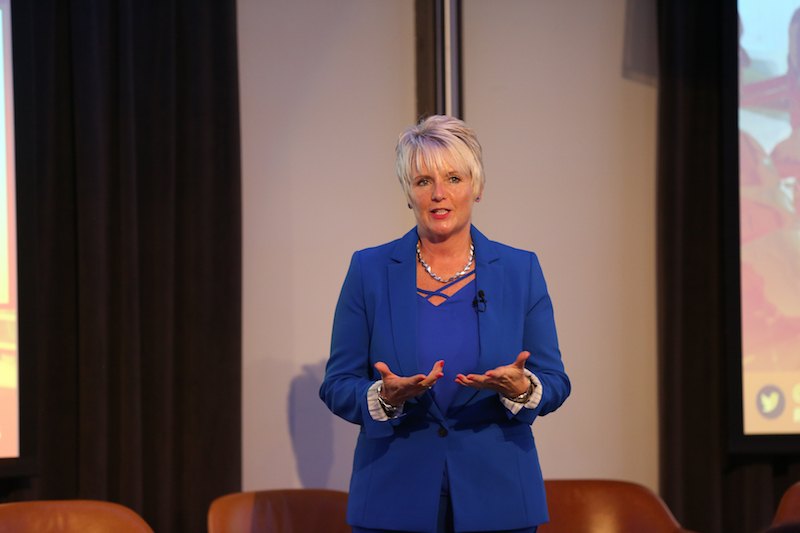
Impactful Leadership – Mandy Flint and Elisabet Hearn, International Award-winning authors and Leadership Strategist. Their 3rd book, “The Leader’s Guide to Impact”, by Financial Times Publishing was released in April 2019
Mandy and Elisabet began the session by defining leadership as the act of impacting and influencing others. They noted that the best leaders are the ones that can put down their phones, turn off their laptops and be there in the moment, giving you their full attention in any convocation. Some leadership behaviours are contagious and create the work culture in a company. If you treat your peers as customers, then you are creating a culture of generous sharing and collaboration. They then moved on to discuss what executive presence looks like, on the outside its one of confidence, approaching people with a smile and making eye contact. On a deeper level, it’s treating colleagues with respect, communicating effectively, inspiring and relating to others. This is the kind of culture you need to create if you want to be a good leader.
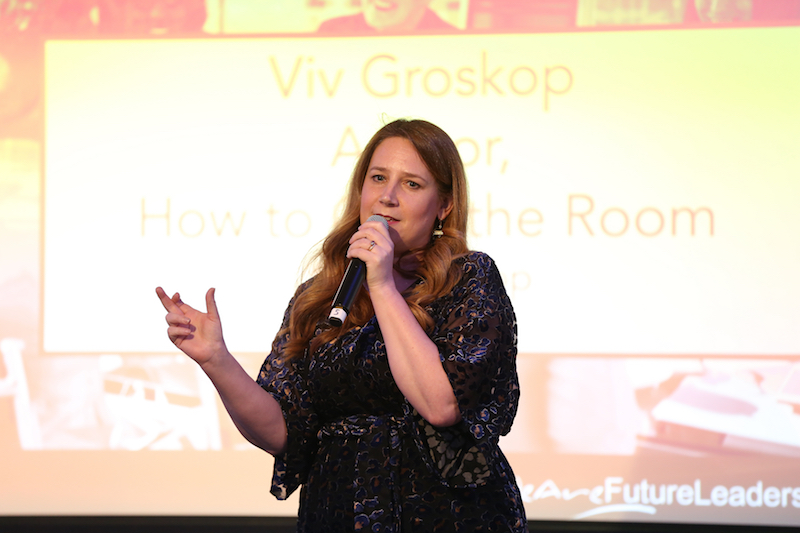
The Importance of Authenticity – Viv Groskop, Author, How to Own the Room
Viv started the session by talking about the importance of authenticity and how we all need to aim to be more open and honest with those around us to be our most authentic selves. However, it’s not always appropriate in every situation to be your most authentic self. In professional scenarios for example, where you are particularly stressed or annoyed, it may not be the wisest move to show the full extent of your frustration. But how do you balance authenticity and professionalism? Viv says the way she deals with these scenarios is to take on a happy high status. To explain what this is, she gave the example of showing up to an event like the Oscars and tapping a waiter on the shoulder and asking him to bring you a drink. A few minutes later he shows up with your drink, only for you to realise that you mistook George Clooney for a waiter. While you might be apologetic for the mistake, George says that he doesn’t mind and hands you your drink with a smile. The attitude that George took in this example is the pinnacle of the happy high status. It is acting with kindness and respect, even if your being asked to do something that isn’t in your remit. Approaching situations with this mindset will help you remain professional circumstance’s where you feel less than up to it.
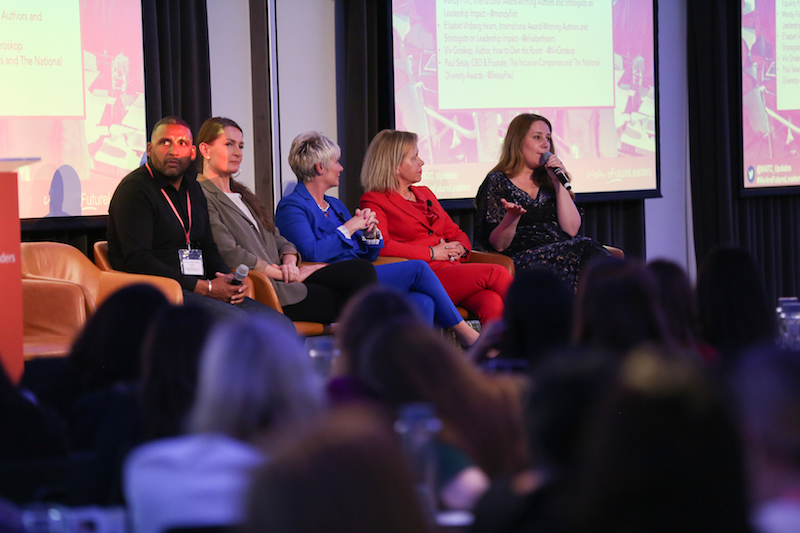
Q&A Panel With Viv Groskop, Sophie Walker, Mandy Flint, Elisabet Hearn & Paul Sesay | CEO & Founder, The Inclusive Companies & The National Diversity Awards
Melanie Euseben hosted this Q&A, the first question asked by the audience was, is there is any difference in leadership styles between genders? Paul commented that it depends on the individual and the circumstance they are in. Sophie added that the structure and the culture of the organisation can play a big part in leadership styles. Female leaders are often forced to organize differently due to the oppressive structure of our society. The audience then asked if the panellists had any practical steps on how to be a good leader. Viv said that you need to give yourself permission to take risks and fail. You need to experiment what your leadership style looks like, as everyone’s is different, but if you be yourself then you should be successful. They were then asked, if the they think it is important to find allies in men, in the fight for gender equality. Sophie commented that if men were going to make changes to the system to include women, then they would have done it a long time ago. However, we are now seeing that steps forward are being made. There has never been a better time to impress upon men the new ideas, styles and strategies of leadership. Paul commented that we need more diversity in leadership, which he thinks can be achieved if women make their voices heard. Sophie remarked that this is particularly for women in the workplace due to continuous systematic injustice. She states that it should not be down to individual women to make changes, but women as a collective need to come together to demand change. The final question of the session was how to deal with failure as a leader. Viv commented that admitting a to failure can be a strength, as it shows you are learning and that ultimately there is no one way to deal with failure. Everyone’s leadership style is different, you have to figure it out as you go.
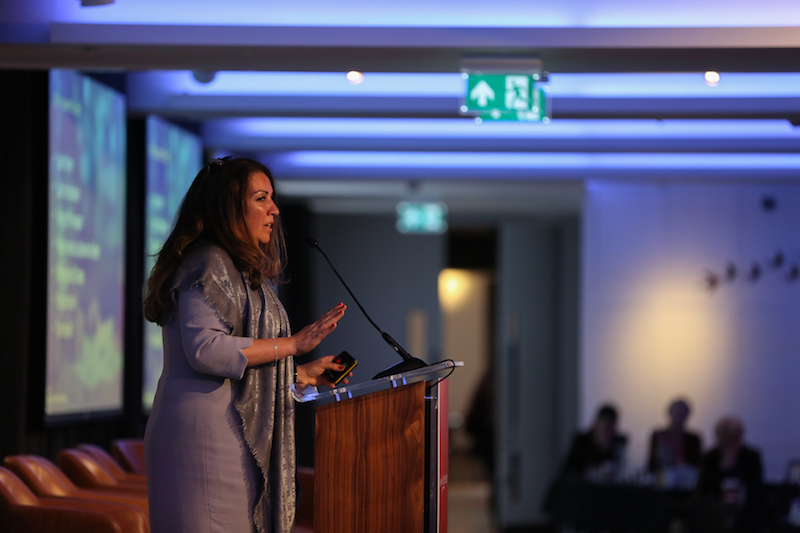
Creating your career plan – Vanessa Vallely OBE, Managing Director, WeAreTheCity
Vanessa started the session by telling us why it is important to create a career plan. It gives you a framework to achieve your goals, helps keep you on track and creates a way for you to track your progress. Things that often get in the way of the plan include a lack of time, motivation and being influenced by the opinion of others around us. It’s important for us to remember that things don’t always go to plan and that sharing your plan with others and asking them for support can only help you in achieving your plan. Asking yourself questions like, what do I want to achieve in the next three years? What goals can I set to support my strategy? What will the benefits of these achievements be? What time frame do I want to assign to these goals? Who can help me achieve this? And how will I measure my success? will help you create your career plan. When it comes to writing your strategy, you should evaluate where you are now, write an overall mission statement that articulates where you want to be. You should detail the necessary steps to get there and each action that you will take to accomplish this. Make sure you prioritise your strategy according to its viability and your own growth goals. When considering how to articulate your strategy try writing down what your overall strategy looks like in three short sentences, including what success looks like for you and what the tangible result would be, e.g. job titles or financial measurements. Detail where you are, what you need to focus on, how to achieve that strategy and why you are doing it. Plan each step out in more detail and prioritize in terms of things you need to learn or gain exposure to. Going forward and acting on your plan can mean that you find it hard to balance it all, so be sure to allow yourself some time to think, ask for help when you need it and be mindful of your mental health and wellbeing.
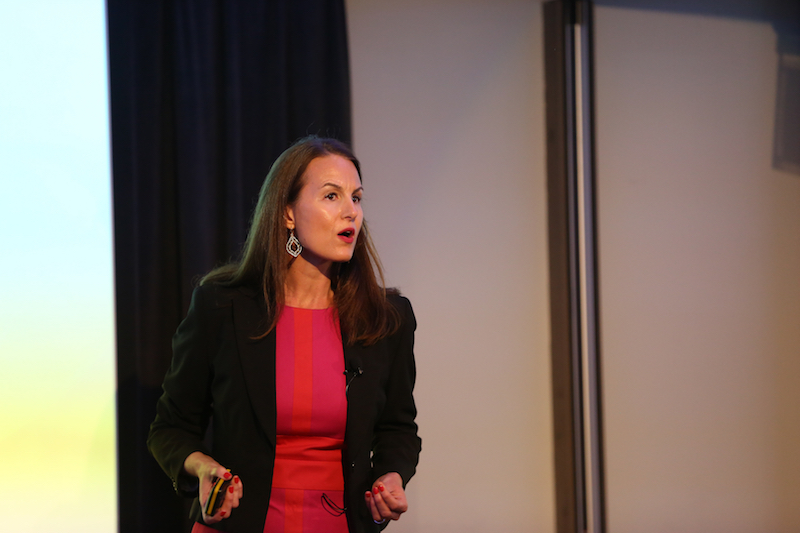
Managing stress, life balance and your mental wellbeing – Includes stress coping strategies, when to recognise the signs of burnout and mindfulness – with Cara de Lange, Wellbeing Mentor, Speaker & Author of Softer Success
Cara began but telling us that 51 per cent of the UK workforce, 45 per cent of the Australian workforce and 40 per cent of the American and Canadian workforce feel stressed and overworked. Stress is the health epidemic of the 21st century. Research has shown that preventing poor mental health is just as important as treating it. So, what step can you take to manage your stress? Be flexible, don’t be afraid to ask for help when you need it, recharge, make sure you rest and get enough sleep. Taking a walk or meditating can also help to relax and slow down a racing mind. Cara continued to inform us that 63 per cent of employees admit to doing work in their holidays, adding that less than 50 per cent of managers know how to talk effectively about mental health. Which is why it is important to set boundaries between your work and home life. For good mental health, it is important to know what your stress triggers are how you can manage them. If you are struggling to copy, write down a to-do list to help organise your thoughts, and be sure to end every day by recognising something that you achieved. But most importantly learn to say no, it’s important to put your self-care first sometimes and it’s okay to not be okay.
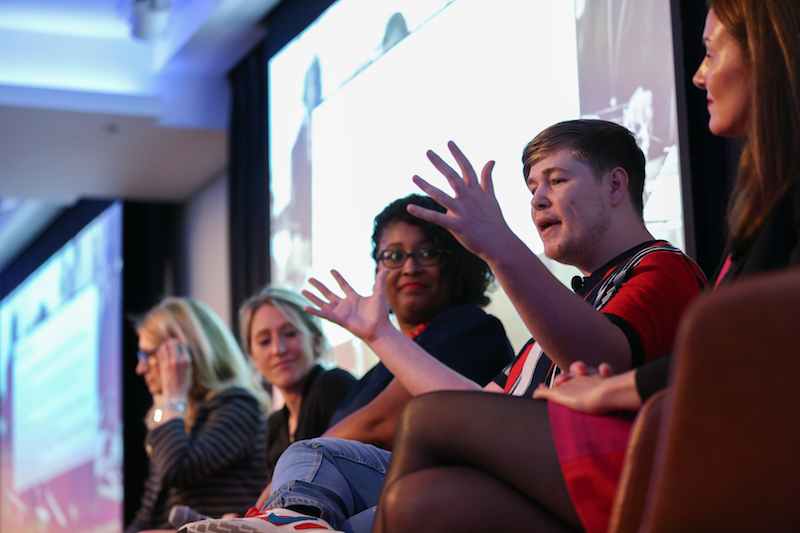
Q&A Panel With Diahanne Rhinney, Founder of Diahanne Rhiney Consultancy, Strength With In Me Foundation (S.W.I.M) & The Baton Award; Cara de Lange, Wellbeing Mentor, Speaker & Author, Softer Success; Jemima Jefferson, Mental Health First Aid Trainer, Mediation Teacher & Inclusion & Diversity Consultant; Jack Parsons, Chief Executive Officer, Big Youth Group & Hope Virgo, Mental Health Campaigner, Public Speaker & Author of Stand Tall Little Girl
In this final Q&A session, the panellists shared their own stories and struggle with mental health. Jemima talked about how she became very stressed at work and, as a result, became very ill. She said that mediation has helped her learn how to stop, slow down and relax more. Hope shared her own struggle with eating disorders, about how it took control of her life at one point and how she is on a continuous path day to day to stay healthy. She mentioned how she thought after she had recovered that her mental health was now invincible, but she learnt that it’s not. Mental health is something you have to work on daily to keep on top of your mental health. Diahanne talked about her struggles with imposter syndrome. Despite being a successful career woman, she still lacked confidence in her own ability, which many powerful and successful women struggle with on and day to basis. But Diahanne believes that this mindset can be overcome, with a dash of self-confidence, finding time to practise self-love and sharing your experience with other women. Finally, Jack told us about his childhood has a career for an alcoholic parent and how this affected his mental health. Even later in life, after successfully starting Big Youth Group, he said that although he was financially successful, he was very lonely and depressed. All the panellists emphasised the importance of focusing on your mental health and wellbeing above all else, and that taking time for yourself and understanding both what makes your mental health decline and improve in vital to maintaining and managing your mental health.





